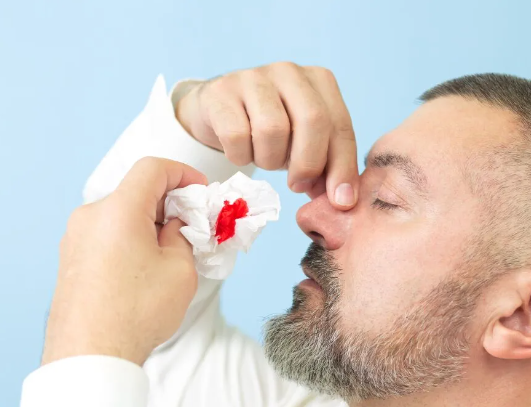Epistaxis (Nose Bleeding)

Understanding Epistaxis (Nosebleeds): Causes, Symptoms, and Treatments
Introduction
Epistaxis, commonly known as a nosebleed, is a condition where bleeding occurs from the tissues inside the nose. While nosebleeds can be alarming, they are usually not serious and can be managed at home. However, in some cases, recurrent or severe nosebleeds may require medical attention.
Types of Nosebleeds
- Anterior Nosebleed:
- The most common type, where bleeding originates from the front part of the nose. It usually results from the rupture of small blood vessels in the nasal septum and is generally easy to control.
- Posterior Nosebleed:
- Less common but more serious, this occurs when bleeding starts deep in the back of the nose. It may require medical intervention as it is often harder to stop.
Causes of Epistaxis
- Dry Air:
- Dry air, especially in heated indoor environments, can dry out the nasal membranes, making them more prone to cracking and bleeding.
- Nasal Trauma:
- Nose picking, forceful blowing of the nose, or an injury to the nose can damage blood vessels and lead to bleeding.
- Allergies or Infections:
- Allergies, sinusitis, or colds can cause irritation and inflammation of the nasal tissues, increasing the risk of nosebleeds.
- Medications:
- Blood-thinning medications (anticoagulants), aspirin, or nasal sprays can increase the likelihood of nosebleeds by reducing blood clotting or causing dryness.
- High Blood Pressure:
- Uncontrolled high blood pressure can cause blood vessels in the nose to become more fragile, leading to spontaneous nosebleeds.
- Underlying Medical Conditions:
- Certain health conditions like blood clotting disorders, liver disease, or tumors in the nasal cavity can contribute to frequent nosebleeds.
Symptoms of Epistaxis
- Bleeding from One or Both Nostrils: Blood may trickle or flow from one or both nostrils.
- Blood in the Throat or Mouth: If blood flows down the back of the throat, you may taste or cough it up.
- Dizziness or Lightheadedness: Heavy bleeding or frequent episodes may lead to feeling faint.
Home Remedies for Epistaxis
- Pinch the Nose:
- Sit upright, lean slightly forward (to avoid swallowing blood), and pinch the soft part of your nose just below the bridge. Hold for 10-15 minutes to stop the bleeding.
- Apply Cold Compress:
- Place a cold compress or ice pack on the bridge of the nose to constrict blood vessels and reduce bleeding.
- Avoid Nose Blowing:
- After a nosebleed, avoid blowing your nose for several hours to prevent re-bleeding.
- Moisturize Nasal Passages:
- Use a saline nasal spray or apply a thin layer of petroleum jelly inside the nostrils to keep them moist and prevent dryness.
- Humidify the Air:
- Using a humidifier can add moisture to the air and reduce the risk of nosebleeds, especially in dry environments.
Clinical Treatments for Epistaxis
- Cauterization:
- In cases of persistent nosebleeds, a doctor may use a chemical or electrical device to cauterize (seal) the blood vessels and prevent further bleeding.
- Nasal Packing:
- For more severe bleeds, nasal packing with gauze or special sponges may be required to put pressure on the blood vessels and stop the bleeding.
- Treatment of Underlying Conditions:
- If high blood pressure, blood clotting disorders, or other medical conditions are causing nosebleeds, treating the underlying issue is crucial.
- Ligation Surgery:
- In extreme cases, surgery may be performed to tie off or block blood vessels that are contributing to recurrent or severe epistaxis.
Alternative/Non-Invasive Treatments for Epistaxis
For epistaxis (nosebleeds), while therapies at Earl Claytont Wellness Centre may not directly stop acute nosebleeds, some treatments can support overall health and potentially reduce the frequency of nosebleeds by improving circulation, reducing inflammation, and supporting the body’s healing processes. These include:
- PEMF (Pulsed Electromagnetic Field Therapy):
- PEMF therapy can improve blood flow and reduce inflammation, which may help strengthen blood vessels in the nasal passages, reducing the likelihood of frequent nosebleeds.
- Vitamin B Complex:
- B vitamins, particularly B12, help maintain healthy blood cells and tissues. A deficiency in B vitamins can lead to fragile blood vessels, contributing to nosebleeds. A B Complex supplement may help improve overall blood vessel health and reduce the frequency of nosebleeds.
- NAD+ Therapy:
- NAD+ therapy supports cellular repair and regeneration, which can help improve the integrity of blood vessels, potentially reducing the occurrence of epistaxis by enhancing overall tissue health and reducing oxidative stress.
These therapies can support overall vascular health and help reduce the frequency of nosebleeds, but frequent or severe epistaxis should be evaluated by a healthcare provider to determine the underlying cause and receive appropriate treatment.
Discover the perfect treatment for you with a FREE MEDICAL ASSESSMENT! Limited slots available – secure yours now by scheduling an appointment. Click below to book now!
When to Seek Medical Attention
- Frequent or Severe Nosebleeds: If you experience nosebleeds that last longer than 20 minutes or occur frequently, see a healthcare provider.
- Heavy Bleeding or Difficulty Breathing: If the bleeding is excessive, or if blood is obstructing your breathing, seek emergency care.
- Bleeding After Head Injury: Nosebleeds after head trauma can be a sign of a more serious condition and should be evaluated by a doctor.
Conclusion
While nosebleeds are often minor and easily managed, recurrent or severe episodes can indicate an underlying issue. Home remedies such as pinching the nose, using a humidifier, and avoiding nasal trauma can help prevent and treat mild cases. For more serious or persistent nosebleeds, medical treatments like cauterization or nasal packing may be necessary. If you're concerned about frequent or heavy nosebleeds, consult a healthcare provider to explore the possible causes and appropriate treatments.

